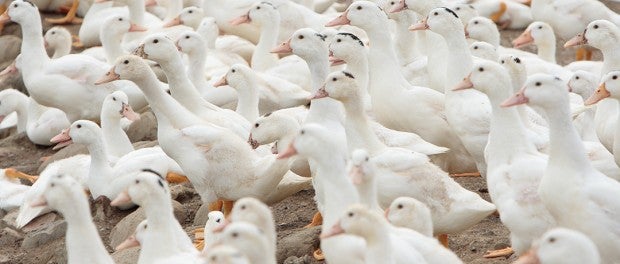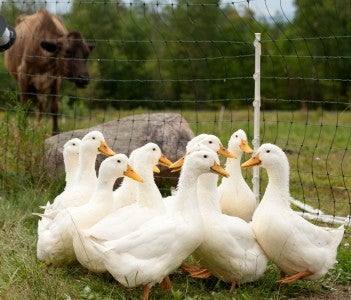Farming with Ducks for Meat and Eggs

When considering meat and egg laying birds for your farm, the go-to is usually chickens. Although chickens are versatile and easy to care for, another poultry animal has just as much to offer, that being the duck. Ducks can serve many purposes on the farm whether it is providing eggs or meat or even helping with pest control. Most breeds are known to have good temperaments, making them a good choice for farms with small children. The lifespan of a duck varies by breed, but most live an average of 15 years, making them a fairly long-term farm resident when cared for properly.
If it is eggs that you have in mind, the most notable difference between duck and chicken eggs is the size. In addition to the overall egg of a duck being larger, the yolk is larger as well, making for a richer taste. As far as nutritional composition, duck eggs contain more fat, protein, and cholesterol as well as vitamin A, B12, folate, and iron. The shell of a duck egg is also much harder and more difficult to crack which gives the egg a longer shelf life. Duck eggs are excellent when used in baked goods, adding a bit more fluffiness than a chicken egg can boast. However, if your goal is to hatch eggs, this can be done in four to five weeks depending on breed.
Should meat be your preference, duck meat is also a very healthy and delicious choice. Rich in selenium and zinc, duck meat aids in enzyme function and cellular metabolism. It is also packed with Vitamins B5 and B12 which are helpful in maintaining good nervous system function. Additionally, duck meat is rich in protein and tastes great any way you prepare it. Ducks take approximately 10 weeks to mature to a slaughtering age, however, before they are fit for the dinner table.
Though there are many obvious benefits to having duck in your diet in one way or another, there is still a need present to house them appropriately. Ducks can live in similar conditions to chickens, but it is necessary to provide them with a place to swim. This is vital not only to their general health and well-being, but also plays a role in the hatching of eggs as wet feathers are thought to aid in the setting process. Ducks need to be able to swim on a daily basis for their mental and physical well-being. Swimming keeps their eyes clean and healthy, preventing blindness that might otherwise occur. If you do not have a naturally occurring pond on your farm, the addition of kiddie pool sunken into the ground will suffice. Just be sure to create a natural ledge for ducklings to safely enter and exit. Drinking water should be separate from their swimming area and kept clean at all times.
If you’re hatching ducklings, they will need some special care, such as artificial heat for several weeks. They also need to be fed a commercial starter in pellet form with at least 20% protein. Continue this until they are a full three weeks old, at which point they can be started on a 16% protein ration. Upon laying, that number will be need to be increased to 18%. Substituting diet with fruits and vegetables is also acceptable as long as those items are small enough to be consumed by young birds when applicable. Ducks will gladly forage for bugs in your garden without destroying it in the process, unlike a chicken that tends to scratch. Although they may nibble at leafy greens, they will leave behind a trail of useful manure, so the trade-off can be worthwhile.
Last but not least, ducks will need protection from predation. This means having a coop for them to go into at night where they will be safe. This structure can be constructed much like a chicken coop would as the purpose it serves is much the same. Good ventilation is important as is protection from the elements and nesting boxes for egg laying. Perches are not necessary as ducks are not known to roost like chickens do.
Before opting for a specific duck, it is wise to research different breeds in order to find a duck that corresponds with the purpose you have in mind. Some breeds make better layers while others are better meat birds. Others yet may make good pets if all you wish to have is a friendly source of pest control. Whichever the duck you choose, you can’t go wrong with adding this multi-purpose animal to your farm. Whether it is feeding on bugs or feeding your farm family, the duck can get the job done.







 Your Privacy Choices
Your Privacy Choices
I am willing to establish a integrated farming where duck is an important specis.I need good species for meat and egg.